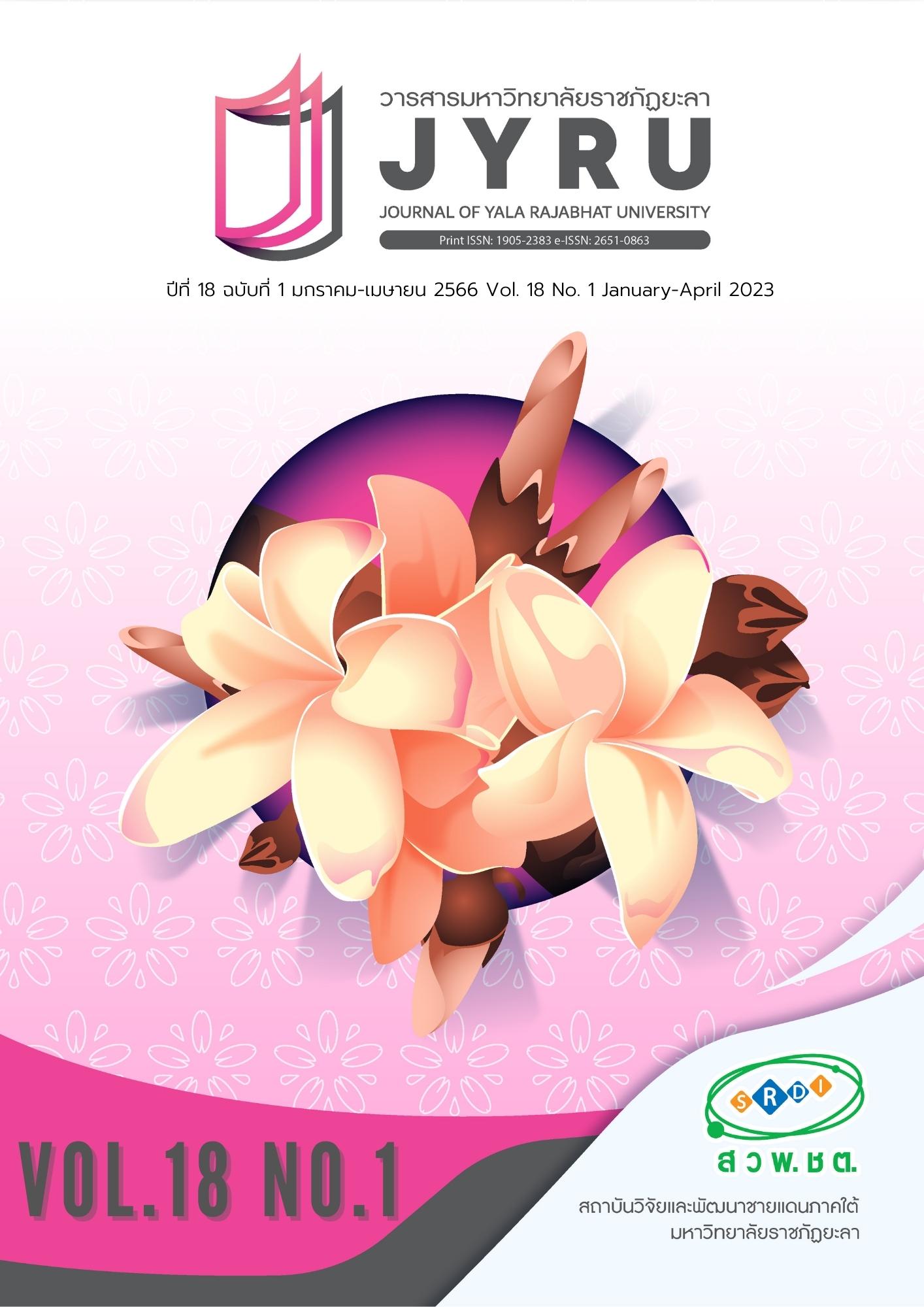The Relationship between Students’ Motivation and Learning Gains in Five Thai Universities.
Main Article Content
บทคัดย่อ
This study aimed to review the relationship between students' motivation and students' learning gains in Thailand universities. Additionally, the study aimed to investigate Keller's ARCS model dimensions that were tested against students' learning gains. However, empirical research focusing on motivation in relation to students' learning gains is mostly limited to secondary schools or specific subject contexts. Five largest universities in Thailand were purposely selected as sampling units and 348 students were selected proportionately as samples of this study. A closed-ended questionnaire was administered online by sharing the link to the contact points of the five universities. Data collection was conducted for two weeks, after which participation was closed. Inferential statistics were generated to test the hypotheses. Data were analysed by a statistical analysis package. Findings from the study revealed that attention (p=0.002), relevance (p=0.000), confidence (p=0.011), and satisfaction (p=0.004) are significantly correlated and related to students' learning outcomes. It was recommended that Universities in Thailand train their faculty to use the ARCS model to enhance students' motivation and learning gains.
Article Details

อนุญาตภายใต้เงื่อนไข Creative Commons Attribution-NonCommercial-NoDerivatives 4.0 International License.
บทความ ข้อมูล เนื้อหา รูปภาพ ฯลฯ ที่ได้รับการเผยแพร่ในวารสารมหาวิทยาลัยราชภัฏยะลานี้ ถือเป็นลิขสิทธิ์ของวารสารมหาวิทยาลัยราชภัฏยะลา หากบุคคลหรือหน่วยงานใดต้องการนำทั้งหมดหรือส่วนหนึ่งส่วนใดไปเผยแพร่ต่อหรือกระทำการใดๆ จะต้องได้รับอนุญาตเป็นลายลักษณ์อักษรจากวารสารมหาวิทยาลัยราชภัฏยะลาก่อนเท่านั้น
เอกสารอ้างอิง
Al-Khasawneh, F. M., & Al-Omari, M. A. (2015). Motivations towards learning English: The case of Jordanian gifted students. International Journal of Education, 7(2), 306-321. http://dx.doi.org/10.5296/ije.v7i2.7699
Asvio, N. (2017). The influence of learning motivation and learning environment on undergraduate students’ learning achievement of management of Islamic Education: Study Program of Iain Batusangkar In 2016. Noble International Journal of Social Sciences Research, 2(2), 16-31.
Bakar, K. A., Tarmizi, R. A., Mahyuddin, R., Elias, H., Luan, W. S., & Ayub, A. F. M. (2010). Relationships between university students’ achievement, motivation, attitude and academic performance in Malaysia. Procedia-Social and Behavioral Sciences, 2(2), 4906-4910. https://doi.org/10.1016/j.sbspro.2010.03.793
Boud, D. (2018). Assessment could demonstrate learning gains, but what is required for it to do so? Higher Education Pedagogies, 3(1), 54-56.
Gribble, C., Rahimi, M., & Blackmore, J. (2017). International students and post-study employment: The impact of university and host community engagement on the employment outcomes of international students in Australia. In International student connectedness and identity (pp. 15-39). Springer, Singapore. 10.1007/978-981-10-2601-0_2.
Hamilton, K., Morrissey, S. A., Farrell, L. J., Ellu, M. C., O'donovan, A., Weinbrecht, T., & O'connor, E. L. (2018). Increasing psychological literacy and work readiness of Australian psychology undergraduates through a capstone and work‐integrated learning experience: Current issues and what needs to be done. Australian Psychologist, 53(2), 151-160. https://doi.org/10.1111/ap.12309
Hayikaleng, N., Nair, S. M., & Krishnasamy, H. N. (2016). Thai students’ motivation on English reading comprehension. International Journal of Education and Research, 4(6), 477-486.
Imsa-ard, P. (2020). Motivation and Attitudes towards English Language Learning in Thailand: A Large-Scale Survey of Secondary School Students. Reflections, 27(2), 140-161.
Kanoksilapatham, B., Khamkhien, A., Kitkha, P., & Na Nongkhai, A. O. (2021). Motivation of Thai University Students from Two Disciplinary Backgrounds Using a Hybrid Questionnaire. LEARN Journal: Language Education and Acquisition Research Network, 14(1), 455-491.
Keller, M. M., Neumann, K., & Fischer, H. E. (2017). The impact of physics teachers’ pedagogical content knowledge and motivation on students’ achievement and interest. Journal of Research in Science Teaching, 54(5), 586-614. https://doi.org/10.1002/tea.21378
Kew, S. N., Pet Sangsri, S., Ratana Olarn, T., & Tasir, Z. (2018). Examining the motivation level of students in e-learning in higher education institutions in Thailand: A case study. Education and Information Technologies, 23(6), 2947-2967.
Kitjaroonchai, N. (2012). Motivation toward English language learning of students in secondary and high schools in education service area office 4, Saraburi Province, Thailand. International Journal of Language and Linguistics, 1(1), 22-33.
Kokkinos, C. M., & Saripanidis, I. (2017). A lifestyle exposure perspective of victimization through Facebook among university students. Do individual differences matter? Computers in Human Behavior, 74, 235-245. https://doi.org/10.1016/j.chb.2017.04.036
Lavankura, P. (2013). Internationalizing higher education in Thailand: Government and university responses. Journal of studies in international education, 17(5), 663-676. https://doi.org/10.1177/1028315313478193
Le, N. T., & Nguyen, D. T. (2022). Student satisfaction with EMI courses: the role of motivation and engagement. Journal of Applied Research in Higher Education, (ahead-of-print).
Li, K., & Keller, J. M. (2018). Use of the ARCS model in education: A literature review. Computers & Education, 122, 54-62. https://doi.org/10.1016/j.compedu.2018.03.019
Milman, N. B., & Wessmiller, J. (2016). Motivating the online learner using Keller's ARCS model. Distance Learning, 13(2), 67-78.
Oranpattanachai, P. (2013). Motivation and English language achievement of Thai undergraduate students. LEARN Journal: Language Education and Acquisition Research Network, 6(1), 26-48.
Organization for Economic Co-operation and Development [OECD]. (2020). Thailand’s education system and skills imbalances: assessment and policy recommendations. Economic Department Working Papers No.1641.
Ravinder, E. B., & Saraswathi, A. B. (2020). Literature review Of conbach alpha coefficient (Α) and Mcdonald's omega coefficient (Ω). European Journal of Molecular & Clinical Medicine, 7(6), 2943-2949.
Rogaten, J., Rienties, B., Sharpe, R., Cross, S., Whitelock, D., Lygo-Baker, S., & Littlejohn, A. (2019). Reviewing affective, behavioral and cognitive learning gains in higher education. Assessment & Evaluation in Higher Education, 44(3), 321-337. https://doi.org/10.1080/02602938.2018.1504277
Roohr, K. C., Liu, H., & Liu, O. L. (2017). Investigating student learning gains in college: A longitudinal study. Studies in Higher Education, 42(12), 2284-2300. https://doi.org/10.1080/03075079.2016.1143925
Rosmayanti, D., & Yanuarti, H. (2018). The relationship between students’ motivation and their learning achievement. Professional Journal of English Education,1, 783-788.
Tonsilp, A. (2013). A path analysis of relationships between factors with achievement motivation of students of private universities in Bangkok, Thailand. Procedia-Social and Behavioral Sciences, 88, 229-238. https://doi.org/10.1016/j.sbspro.2013.08.501.


